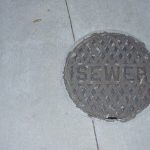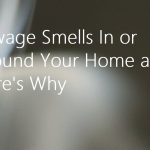Having a sewage odor in and around your home can be very irritating and uncomfortable. After all, many of the plumbing systems in our homes are dedicated to removing waste and ensuring that we cannot smell it at all. Sadly, when you can smell sewage, it’s a sign that there could be a serious problem with your wastewater system that needs immediate attention from a local certified plumber.
The Wastewater Plumbing Systems
The wastewater plumbing systems in your home need gravity, clog free pipes and fresh air venting to drain the waste away effectively. When any of these three needs is interrupted, it can lead to a drainage problem. Sometimes, these problems are located near to the bathroom, but they can also be caused by an overflowing septic tank or a sewer line blockage. Let’s look at some common causes of sewage odor in and around your home.
A Dry Sink Trap
Every sink has a trap located below it; this holds water to prevent foul smelling gases from leaking back into the home from a septic tank or sewer line. If the sink hasn’t been used for a while, the water located in the trap can evaporate, and the trap will be dry. If the traps stay dry, the sewer gases can build up over time, and a really offensive odor will greet you when you open the door. This is unpleasant, but it could even be dangerous, methane gas is explosive in high concentrations, the gases may also be toxic and dangerous to breathe. This is a common issue in vacation homes when you may not be there for months at a time. If you have someone watching your home ask them to pour some water down the kitchen and bathroom sinks and the toilet bowls from time to time. If you’re turned the water off, leave behind some jugs or containers of water to pour in the traps.
A Sink Overflow Clog
Sometimes, the sink overflow will become clogged with a sufficient quantity of gunk to make the air smell foul in your bathroom. The sink overflow hole is needed as a precaution to prevent flooding if someone forgets to turn the tap off. Over time, organic debris can build up on or around the sink overflow, and this can be noticed as grunge like deposits. This organic matter can be cleaned with white vinegar, simply rub it in with a clean cloth or scrub it with a brush. Diluted bleach can then be used to kill any remaining bacteria, and the bad odor should be gone. If the smell persists, call a local professional plumber, and they can search for any underlying issues.
A Clogged Vent Pipe
The bathroom plumbing in your home should have a vent that protrudes outside through the roof space. This vent should have a screen to cover it. This is necessary to protect against birds making a nest there. This vent pipe can also become cracked, and this will allow sewer gases to leak back into your bathroom. A vent pipe can also become clogged with leaves that collect in the pipe, they build up over time and then a clog is formed. A common sign that you have a clogged vent is that all of the drains in your home will be running slow. If you run the water in each sink, they will drain slowly, and if you hear a gurgling or bubbling noise, you may have a blocked sewer line. If you’re comfortable working on a roof, you can locate the vent, check for any obstructions and clear them. It’s a good idea to bring a flashlight with you so that you can see deeper into the vent pipe. If you’re not comfortable working on your roof or you suspect that you have a cracked vent pipe you need to contact a local certified plumber for expert help.
A Blocked Sewer Line
The smell of sewage can sometimes be caused by a plumbing blockage that could be located in the sewer line itself. Some signs of this are a strong sewer gases odor and slower drains on the first floor or in the basement. In more serious cases, you may even have some sewage backing up and running out of your plumbing fixtures. The sewer line is designed as the path of least resistance for waste and if it’s blocked the sewage will exit at the nearest main drain line. Again, you may hear a bubbling or gurgling sound accompanied by a faint sewage odor and the fixtures may drain slower than usual. These are all early warnings that a blockage is forming in your sewer line. This is often caused by tree or plant roots that are seeking an easy source of underground water. As the sewer line ages, small gaps can appear in the joints and the roots are drawn to them. Over time the roots burrow into the line, and this will block the sewer line. A blockage can also occur if the sewer line is old and degraded, cracks will form, and eventually, the line will crumble and collapse entirely. A professional plumber will be able to detect the exact cause, in some cases they can clear the blockage, and in others, the line may have to be repaired or replaced.
An Overflowing Septic Tank
The bad sewage odor in your bathroom could be caused by an overflowing septic tank. Every septic tank needs to be pumped clean periodically to ensure that it can work as intended. If you suspect that this is the case, contact a company to pump your septic tank for you. This is especially true if you’re new to the home and you don’t know when it was last done. If the problem persists it contact a local certified plumber for expert help and advice.
A Toilet Leak
A toilet is installed on a wax ring, then it’s bolted down, and the area between the fixture and the floor is caulked to prevent leaks. Over time, the bolts can loosen, the caulk can dry out, and the toilet may develop some movement. This can lead to leaks, bacterial growth and water damage to the floor underneath. If this is allowed to continue, the entire wooden sub-floor can rot away, and it will have to be replaced. It’s a better idea to get the problem fixed quickly by contacting your
local plumber.
By Giovanni Longo President Flood Brothers Plumbing
Giovanni Longo is a 3rd generation master plumber who has been practicing his craft and trade in the greater Los Angeles area for well over a decade and a half. A plumbing and hydraulics-engineering innovator, Giovanni’s particular world-class expertise focuses on dealing with challenging sewer system designs as well as resolving complex commercial and residential draining issues. As a certified Flood Mitigation expert, he is also well versed in a wide variety of water damage and remediation solution.





